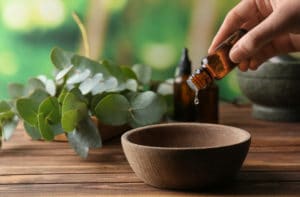
Essential oils have skyrocketed in popularity over the past three years or so. Many people use different types of essential oils in diffusers to create a calming atmosphere. Some also rub essential oils on their bodies as a complementary treatment for several conditions.
You might want to try using essential oils for depression, even though they aren’t a cure for this disorder. Although the efficacy of using essential oils for depression is limited, it may help you manage it and relieve some symptoms. Let’s look deeper into the world of depression and essential oils, as well as how they can help you feel better.
What is Depression?
Depression, also known as major depressive disorder, is used to describe a number of disorders characterized by persistent sadness, hopelessness, and fatigue. It’s one thing to feel depressed or sad occasionally when something bad happens to you. However, feeling this way for a prolonged period is cause for concern. Clinical depression affects how you function every day as well as your performance at work and school.
You can’t just “snap out” of depression and “get over” your feelings. Depression requires clinical treatment, and in most cases prescription medication and therapy.
Signs and Symptoms of Depression
Although we can all feel down from time to time, there is cause for worry when you experience the following signs and symptoms for weeks and months at a time. Watch out for these signs in yourself or your loved one.
Signs and symptoms of depression include:
- Feelings of hopelessness, despair, or emptiness
- Isolation from friends and family
- Withdrawing from activities you used to enjoy
- Lack of energy (even small tasks take much effort)
- Back pain, headaches, and other unexplainable physical problems
- Restlessness, anxiety, or agitation
- Trouble remembering things or making decisions
Types of Depressive Disorders
Although major depressive disorder is the most common form of depression, there are more specific depressive disorders.
- Bipolar disorder: Also known as manic depression, this involves extreme mood swings ranging from high energy to depressive periods. During these “lows,” they show typical symptoms of depression.
- Seasonal affective disorder (SAD): This form of depression happens during the winter months when there are shorter days and less sunlight.
- Persistent depressive disorder: This lasts two years or longer. It was previously known as two separate conditions: chronic major depression and dysthymia (low-grade persistent depression).
- Postpartum depression: This occurs in some women after they give birth. Depression symptoms can get so severe that mothers can end up neglecting their children.
- Psychotic depression: Along with typical symptoms of depression, this disorder involves hallucinations, paranoia, and delusions.
What Are Essential Oils?
Essential oils are concentrated plant extracts. Manufacturers extract these chemical compounds from all different parts of a plant, including the roots, bark, flower, and stem. Some methods used for extraction include distillation, usually by water, steam, or cold pressing. Essential oils are what remain after a distillation process.
Essential oils are popularly used in aromatherapy, which uses these to improve physical or psychological well being. Users will rub essential oils on their skin or inhale them through the nose or mouth.
People react differently to scents, and smell is one of the most powerful senses. One person might recognize 1 trillion different scents. People tend to relate a scent with a treasured memory or even one they previously forgot. These positive emotions can have a lasting effect on a person. For this reason, essential oils can be beneficial in helping ease certain symptoms of depression.
Essential Oils for Depression

Here are a few essential oils that could be used for depression.
Bergamot
Bergamot oil, which has a citrus scent, is known to be calming and uplifting. One study showed that patients involved in bergamot oil aromatherapy felt less anxiety while waiting for outpatient surgery. Since anxiety is a possible complication of depression, using bergamot oil can be beneficial.
Although it isn’t clear exactly how bergamot relieves nervousness, it is shown to lessen the release of stress hormones when you’re in a tense situation.
Lavender
Lavender oil, which has a floral and earthy scent, is another calming essential oil for depression. Some studies show that using lavender oil can improve mood, lower stress, promote relaxation, and ease anxiety.
One study from 2003 showed that lavender tincture (similar to an essential oil but made with grain alcohol and fresh herbs) could help with mild to moderate depression. In the study, it had a similar effect to that of imipramine, an antidepressant.
Wild Ginger
Wild ginger might have some antidepressant properties. Stress-challenged mice in an animal study showed less depression-like behaviors when they inhaled wild ginger oil. Researchers believe that the oil might trigger a set of transmitters in the brain associated with depression called the serotonergic system. Activating this system could slow down the release of stress hormones.
Other Oils
Other essential oils for depression that could help relieve symptoms include:
- Grapefruit
- Frankincense
- Chamomile
- Sandalwood
- Jasmine
- Neroli
- Sweet Orange
Rose oil and ylang-ylang oil also can decrease “automatic functions”: heart rate, breathing rate, and blood pressure. This can be beneficial for those suffering from depression, as they can have higher-than-normal heart rates.
However, most supporting evidence for these oils’ effects on depression is anecdotal, not concrete.
How to Use Essential Oils for Depression
How you use essential oils (through rubbing or inhalation) is up to you. Either way, you should benefit from them. Here are a few popular ways to inhale essential oils for depression:
- Adding a few drops to an oil diffuser and inhaling it directly
- Inhaling the oil directly from the bottle or an inhaler tube
- Putting a few drops onto a cotton ball and inhaling it
- Adding several drops into a bottle of massage oil and enjoying an aromatherapy massage
- Mixing some essential oil with honey or milk and adding it to your bathwater for a relaxing aromatherapy bath
Another way to use essential oils for depression is to combine several of them. One study showed that a mix of bergamot, frankincense, and lavender oils relieved some depression and pain in cancer patients when they received hand massages for seven consecutive days.
Warnings and Risks
Although using essential oils for depression is normally harmless, there are a few risks and warnings. Children, pregnant women, and those with respiratory problems shouldn’t use these unless directed by a doctor or aromatherapist. Women who are breastfeeding should also avoid using essential oils.
Essential oils can sometimes cause an allergic reaction. For this reason, you shouldn’t apply them to your skin directly unless they’re diluted. To do this, for every three to six drops of essential oils, you should add one drop of a “carrier oil.” Examples of these include:
- olive oil
- jojoba oil
- sweet almond oil
- coconut oil
Before applying large amounts to your skin, you should test on a small area about 24 hours before. By doing this, you can see if you have an allergic reaction to the oil. You should also buy essential oils from a respected manufacturer since they’re not regulated by the Food and Drug Administration.
Alternative Treatments for Depression
As we mentioned earlier, essential oils for depression are normally meant as a complementary treatment for the disorder. Doctors will usually recommend/prescribe the following treatments for depression.
- Prescription antidepressants
- Selective serotonin reuptake inhibitors (SSRIs): These medications ease symptoms of depression and anxiety. Some examples of SSRIs are Zoloft, Lexapro, Prozac, and Paxil.
- Therapy (both one-on-one and group sessions): Individual and group therapy are highly beneficial for people suffering from depression. Your therapist will help you discover the root cause of your mental health disorder and help you develop healthy coping mechanisms.
- Inpatient treatment: This is best for people who have severe depression and possibly a co-occurring substance use disorder. Inpatient treatment can last anywhere from a few weeks to a month, depending on the severity of your depression. Programming can include therapy, detox (if there’s an existing substance use disorder), and other alternative programs like art therapy and music therapy. Journaling may also be encouraged.
- Electroconvulsive therapy: This is better for people who aren’t responding to prescription medication or are at an increased risk of suicide.
- Transcranial magnetic stimulation: This process is for those who aren’t responding to antidepressants. It stimulates nerve cells to improve symptoms of depression.
Find Treatment for Depression and Addiction at Harmony Ridge
At our West Virginia rehab facility, you’ll find a kind and compassionate staff. Our campus is located among beautiful mountains that will take you away from the negative environment you’ve experienced. With plenty of opportunities for recreation and leisure, you’ll never be bored.
We offer residential, intensive outpatient, and outpatient treatment that will fit your needs. Our staff understands that there isn’t one right method for treatment, which is why we also offer holistic and alternative care. You don’t have to let addiction and negative mental health symptoms take over your life any longer.
Harmony Ridge can give you the treatment you need to overcome substance use disorder. Contact us today to learn more. There is hope for you!
References:
https://www.healthline.com/health/depression/essential-oils-for-depression#other-treatments
https://www.medicalnewstoday.com/articles/315481#quality-of-evidence-on-essential-oils
https://www.mayoclinic.org/diseases-conditions/depression/symptoms-causes/syc-20356007



